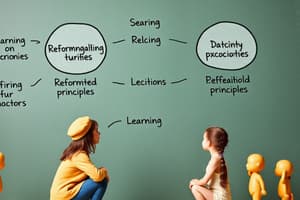Podcast
Questions and Answers
What is the primary focus of Behavioral Modification training?
What is the primary focus of Behavioral Modification training?
- Social Learning Theory
- Goal Setting Theory
- Expectancy Theory
- Reinforcement Theory (correct)
Which of the following can increase Self-Efficacy?
Which of the following can increase Self-Efficacy?
- Offering verbal persuasion (correct)
- Avoiding practice
- Ignoring past accomplishments
- Setting unrealistic goals
According to Maslow's Hierarchy of Needs, what defines a need?
According to Maslow's Hierarchy of Needs, what defines a need?
- A learned behavior from observation
- A psychological state that is always fulfilled
- An outcome based on cultural expectations
- A deficiency a person is experiencing at any given time (correct)
What does Instrumentality in Expectancy Theory refer to?
What does Instrumentality in Expectancy Theory refer to?
What does SMART stand for in Goal Setting Theory?
What does SMART stand for in Goal Setting Theory?
Which process is NOT part of Social Learning Theory's learning processes?
Which process is NOT part of Social Learning Theory's learning processes?
What does Adult Learning Theory emphasize regarding adult learners?
What does Adult Learning Theory emphasize regarding adult learners?
What does Competency-Based Training focus on?
What does Competency-Based Training focus on?
Which of the following is a key factor in Expectancy Theory's behavior model?
Which of the following is a key factor in Expectancy Theory's behavior model?
What is a characteristic of Management by Objectives?
What is a characteristic of Management by Objectives?
Flashcards
Positive Reinforcement
Positive Reinforcement
A process where pleasurable outcomes are used to encourage desired behavior.
Negative Reinforcement
Negative Reinforcement
A process where unpleasant outcomes are used to discourage undesirable behavior.
Social Learning Theory
Social Learning Theory
People learn by observing and imitating others they see as credible and knowledgeable.
Self-Efficacy
Self-Efficacy
Signup and view all the flashcards
Need
Need
Signup and view all the flashcards
Expectancy Theory
Expectancy Theory
Signup and view all the flashcards
SMART Objectives
SMART Objectives
Signup and view all the flashcards
Management by Objectives (MBO)
Management by Objectives (MBO)
Signup and view all the flashcards
Information Processing Theory
Information Processing Theory
Signup and view all the flashcards
Competency-Based Training
Competency-Based Training
Signup and view all the flashcards
Study Notes
Reinforcement Theory
- Positive reinforcement involves pleasurable outcomes and rewards.
- Negative reinforcement involves unpleasant outcomes.
- Behavioral modification training uses reinforcement theory.
Social Learning Theory
- Learning occurs by observing credible and knowledgeable models.
- Behaviors that are reinforced or rewarded tend to be repeated.
- Learning is influenced by self-efficacy.
Self-Efficacy
- Self-efficacy is a personal judgment about one's ability to learn or acquire skills.
- Self-efficacy can be improved by verbal persuasion, logical verification, observations from others, and past accomplishments.
Four Processes in Social Learning
- Attention
- Retention
- Motor reproduction (practice)
- Motivational processes
Needs Theories
- Needs represent deficiencies a person experiences.
- Maslow's hierarchy of needs describes these deficiencies.
Expectancy Theory
- A person's behavior is based on three factors:
- Expectancy: the link between trying to perform and actually performing.
- Instrumentality: the belief that performing a behavior is associated with a particular outcome.
- Valence: the value a person places on an outcome (e.g., importance of performing better on a job).
Goal-Setting Theory
- SMART goals are specific, measurable, achievable, realistic, and time-bound.
- Management by objectives (MBO) involves setting objectives and evaluating performance periodically.
Information Processing Theory
- Processes describe how training content is learned and retained.
Adult Learning Theory (Malcolm Knowles)
- Adults need to understand why they are learning.
- Adults prefer self-directed learning.
- Adults bring diverse experiences to learning.
- Adults are motivated to learn.
Competency-Based Training
- Competency-based training focuses on specific skills or competencies.
Cognitive, Affective, and Psychomotor Domains
- Cognitive domain: mental skills
- Affective domain: emotional areas such as attitude, feelings, etc.
- Psychomotor domain: skills requiring physical/body movement.
Studying That Suits You
Use AI to generate personalized quizzes and flashcards to suit your learning preferences.




